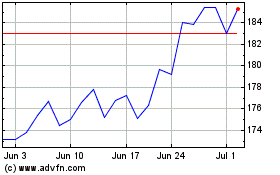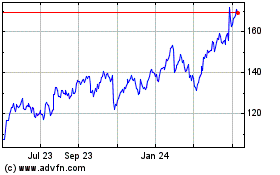Waymo Calls Uber a 'Cheater' as Driverless-Car Trial Begins
February 05 2018 - 3:29PM
Dow Jones News
By Greg Bensinger
SAN FRANCISCO -- Silicon Valley's biggest legal battle in years
began on Monday as lawyers from Alphabet Inc.'s Waymo and Uber
Technologies Inc. traded barbs in a federal case that could have
significant implications for the race to bring robot cars to the
streets.
During opening remarks in front of a 10-person jury sitting less
than a mile from Uber headquarters, Waymo's lawyers portrayed
Uber's former chief executive, Travis Kalanick, as a cheater who
would do anything to catch up to his competitor.
Uber's attorneys pushed back in their defense, calling Waymo's
portrayal "quite a story" while denying the allegations that Uber
swiped trade secrets and knowingly used them to develop autonomous
vehicles. He said there was no conspiracy or cheating. "Period, end
of story."
The high-stakes showdown pits an offshoot of Google against a
highflying startup in Uber, two companies estimated to be worth
tens of billions of dollars and among the leaders in
autonomous-vehicle development. The case could test intellectual
property law in Silicon Valley where top engineers with technical
chops are constantly being poached by rival companies.
Waymo sued Uber nearly a year ago in the U.S. District Court for
the Northern District of California, claiming the startup ransacked
the tech giant's design secrets after paying about $680 million in
2016 to buy autonomous-truck company Otto, founded by a former star
engineer at Google, Anthony Levandowski. Uber has denied the
allegations.
Waymo will seek an injunction to prevent Uber from developing
further aspects of its driverless-car technology and possible
damages that could reach into the billions. Both companies are
vying for a stake in the auto industry which claims some $2
trillion in annual revenue, according to Deloitte Consulting.
Waymo's lawyer, in his opening remarks, pointed to Mr. Kalanick
for allegedly conspiring to have Mr. Levandowski bring his files
and know-how from years of developing the technology at Google. He
said Uber tried to cover its tracks through clandestine meetings
and erasing emails and text messages.
Uber needed "to win at all costs and losing is not an option --
they would do anything they needed to do to win, no matter what,"
said Charles Verhoeven, the lawyer representing Waymo from Quinn
Emanuel Urquhart & Sullivan LLP. Mr. Kalanick "made a decision
that winning was more important than obeying the law; he decided to
cheat."
A spokesman for Mr. Kalanick declined to comment Monday. An
attorney for Mr. Levandoski declined to comment. Mr. Kalanick has
denied any theft in depositions, and Mr. Levandowski has previously
indicated he will invoke his Fifth Amendment right against
self-incrimination.
The case hinges on a technology known as lidar, or light
detection and ranging systems, which is used to guide self-driving
vehicles. Waymo will seek to convince the San Francisco jury to put
a stop to Uber's development of lidar based on what it says is its
proprietary technology, and potential damages that could reach into
the billions of dollars.
Mr. Verhoeven presented evidence including steps Mr. Levandowski
took to download thousands of Google files to his personal
computer.
Uber's attorney, Bill Carmody from Susman Godfrey LLP, called
the downloaded files unimportant, saying Uber never received or
used any proprietary information. He said engineering talent is
essential in developing self-driving car technology, which drove
Uber's acquisition of Otto and its employment of Mr.
Levandowski.
Waymo has sued because it wanted to prevent Uber from getting
its top engineers, argued Mr. Carmody. "It's all about Google
worrying about their talent, their engineers leaving," he said.
Judge William Alsup has challenged Waymo attorneys to prove not
just that Uber arranged for the trade secrets to be stolen, but
also that it used them inappropriately in its development of lidar.
That may mean convincing the jury of technical subtleties in
software code and sensors.
Uber was aware Mr. Levandowski took the trade secrets but has
argued it never used them in its development of lidar or other
self-driving car technology.
Write to Greg Bensinger at greg.bensinger@wsj.com
(END) Dow Jones Newswires
February 05, 2018 15:14 ET (20:14 GMT)
Copyright (c) 2018 Dow Jones & Company, Inc.
Alphabet (NASDAQ:GOOGL)
Historical Stock Chart
From Mar 2024 to Apr 2024

Alphabet (NASDAQ:GOOGL)
Historical Stock Chart
From Apr 2023 to Apr 2024
